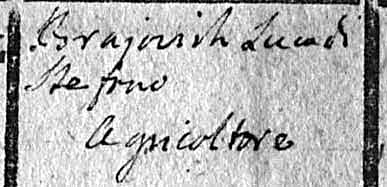| Croatia-in-English.com |
How the Croatian alphabet |
|
Vital Journal -- Christening |
home > genealogy > tutorials > Lesson 5 > vital journal < you are here |
Example of a Christening Journal (oldest style of Matic"na Knjiga)

Document: PloK1-p3; First Krstenih Knjiga (K1; Christening Book) of the Catholic church in Ploc"ice (Plo), Konavle, Croatia; page 3 (p3).
This is part of the 3rd page of the oldest Christening journal in the Ploc"ice church. This book was started in 1808 after all previous books were burned (in 1806). See here for more information on these journals.
Written in Latin. The highlighted section reads as follows:
Anno D'ni [Domini] 1809 die 12 9bris
N. 22 Ego Joannes Tarasc Peus [Parochus] S. Lazzari de Plocize Baptizavi infantam natum die 6 supra
dicti mensis et anni e Vucislavo Stephani Brajovich, et Helena filia Joannis Sargotta
ambobus de Miculichi Conjugibus cui infanti impositum est nomen Stephanius. P.P. [Padrini] fue-
re Petrus Nikolai Metcovich, et Catharina uxor Marci Trojan ambo de Miculichi.
In English but with Croatian names:
In the year of our Lord 1809, day 12 of November
Number 22. I, Ivo Taras", priest of St. Lazarus [church] of Ploc"ice, baptized the infant born on the 6th day of the previously
stated month and year to Luka (whose father was Stjepan) Brajovich, and Jele, daughter of Ivo Srgota,
living in Mikulic'i. The infant was given the name of Stjepan. Godparents were
Pero (whose father was Nikola) Metkovich, and Kate, wife of Marko Trojan, living in Mikulic'i.
Comments: Vuc"islavo = Vukislav = Vuko = Luko = Luka*. Joannes = Ivan = Ivo = John. Helena = Jelena = Jele. The date given at the top is always the Christening date (this is a book of Christenings). The date of birth is usually given in the text. No mention of the sex of the infant is given except the name Stephanius is male. After P.P. are listed the godparents.
*It has been pointed out by a reader that Vukislav and Luka are not the same names because there are 2 separate Saints Days for people with these names. I know very little about Saints' name days; what I'm trying to explain here is that this man was referred to as "Vukislav" by the priest in this document (I have no idea why) yet his name was actually Luka, as can be seen in the image (below) from the Stanja Dus"a for the same family. It has been explained by Dr. Nenad Vekaric' in some of his writings that Vuko- is a Slavic name root and Luka is not. However, at some point (I think it was in the 1600s), a lot of Bible names came into use in what is now southern Croatia, and some of these Bible names replaced the old Slavic names even though they had no relationship to each other etymologically. Luka/Vuko were one set of these types of names. Almost all church records in southern Croatia show the name as "Luka." However, it is true that a man with the name "Luka" will often have the nickname of "Vuko" or some variant.
Above this man is referred to as Vucislav Stephan Brajovich; here he is Luca di Stefano Brajovich. (Agricoltore = farmer)
